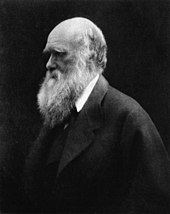
During the Darwin family's 1868 holiday in her Isle of Wight cottage, Julia Margaret Cameron took portraits showing the bushy beard Darwin had grown by 1866.

An 1871 caricature following publication of The Descent of Man was typical of many showing Darwin with an ape body, identifying him in popular culture as the leading author of evolutionary theory.
The Church of England's response was mixed. Darwin's old Cambridge tutors Sedgwick and Henslow dismissed the ideas, but liberal clergymen interpreted natural selection as an instrument of God's design, with the cleric Charles Kingsley seeing it as "just as noble a conception of Deity". In 1860, the publication of Essays and Reviews by seven liberal Anglican theologians diverted clerical attention from Darwin, with its ideas including higher criticism attacked by church authorities as heresy. In it, Baden Powell argued that miracles broke God's laws, so belief in them was atheistic, and praised "Mr Darwin's masterly volume [supporting] the grand principle of the self-evolving powers of nature". Asa Gray discussed teleology with Darwin, who imported and distributed Gray's pamphlet on theistic evolution, Natural Selection is not inconsistent with Natural Theology. The most famous confrontation was at the public 1860 Oxford evolution debate during a meeting of the British Association for the Advancement of Science, where the Bishop of Oxford Samuel Wilberforce, though not opposed to transmutation of species, argued against Darwin's explanation and human descent from apes. Joseph Hooker argued strongly for Darwin, and Thomas Huxley's legendary retort, that he would rather be descended from an ape than a man who misused his gifts, came to symbolise a triumph of science over religion.
Even Darwin's close friends Gray, Hooker, Huxley and Lyell still expressed various reservations but gave strong support, as did many others, particularly younger naturalists. Gray and Lyell sought reconciliation with faith, while Huxley portrayed a polarisation between religion and science. He campaigned pugnaciously against the authority of the clergy in education, aiming to overturn the dominance of clergymen and aristocratic amateurs under Owen in favour of a new generation of professional scientists. Owen's claim that brain anatomy proved humans to be a separate biological order from apes was shown to be false by Huxley in a long running dispute parodied by Kingsley as the "Great Hippocampus Question", and discredited Owen.
Darwinism became a movement covering a wide range of evolutionary ideas. In 1863 Lyell's Geological Evidences of the Antiquity of Man popularised prehistory, though his caution on evolution disappointed Darwin. Weeks later Huxley's Evidence as to Man's Place in Nature showed that anatomically, humans are apes, then The Naturalist on the River Amazons by Henry Walter Bates provided empirical evidence of natural selection. Lobbying brought Darwin Britain's highest scientific honour, the Royal Society's Copley Medal, awarded on 3 November 1864. That day, Huxley held the first meeting of what became the influential X Club devoted to "science, pure and free, untrammelled by religious dogmas". By the end of the decade most scientists agreed that evolution occurred, but only a minority supported Darwin's view that the chief mechanism was natural selection.
The Origin of Species was translated into many languages, becoming a staple scientific text attracting thoughtful attention from all walks of life, including the "working men" who flocked to Huxley's lectures.Darwin's theory also resonated with various movements at the time.
and became a key fixture of popular culture. Cartoonists parodied animal ancestry in an old tradition of showing humans with animal traits, and in Britain these droll images served to popularise Darwin's theory in an unthreatening way. While ill in 1862 Darwin began growing a beard, and when he reappeared in public in 1866 caricatures of him as an ape helped to identify all forms of evolutionism with Darwinism.
0 comments:
Post a Comment